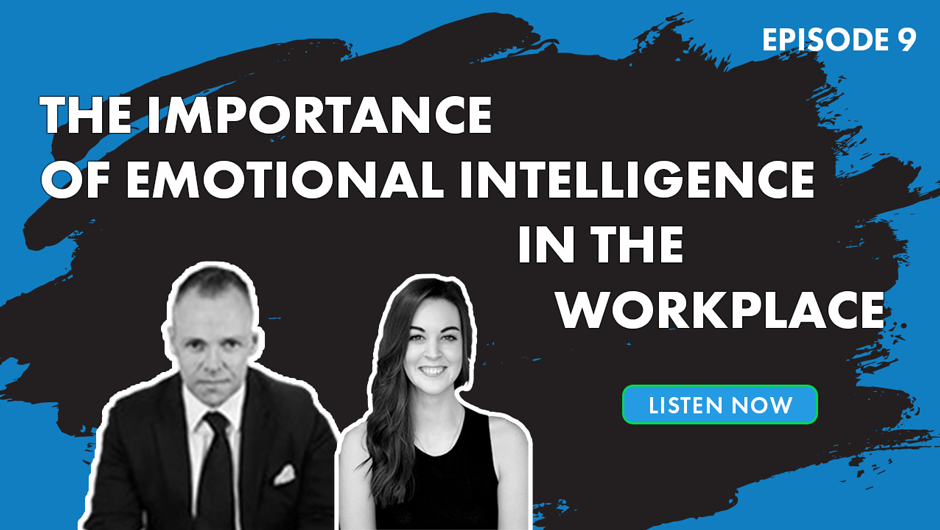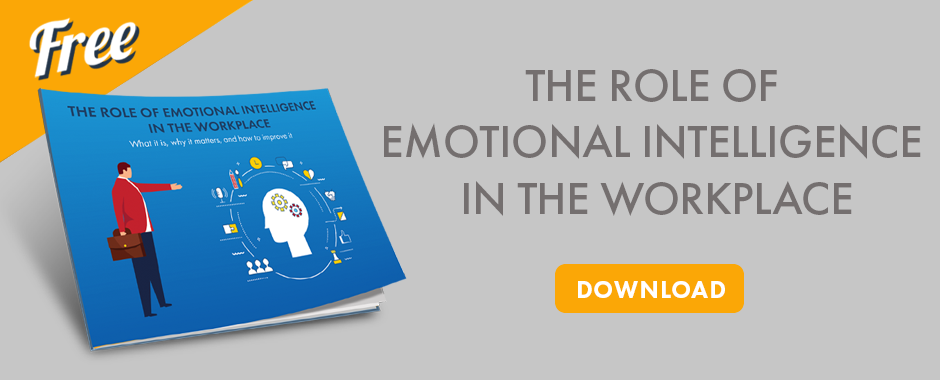In this article, we will explore the top questions about emotional intelligence, including: what is emotional intelligence, how is "EQ" different from "IQ", why does emotional intelligence matter in the workplace, what does emotional intelligence look like, and more.
1. What is Emotional Intelligence?
Emotional intelligence (EQ) is defined as "the capacity to be aware of, control, and express one's emotions, and to handle interpersonal relationships judiciously and empathetically."
EQ allows you to monitor your own emotions and those of the people around you. It helps you to discriminate between different emotions in order to guide your thinking and behaviour. Someone with a high level of EQ will be able to understand why they feel how they do, and how their emotions can affect other people (think of someone who shouts under stress versus someone who remains calm and collected).
There are 5 characteristics that make up emotional intelligence:
1. Self-Awareness: Knowing how you feel and how your emotions and your actions can affect the people around you.
2. Self-Regulation: Staying in control despite experiencing varying emotions.
3. Motivation: The general desire or willingness of someone to do something.
4. Empathy: The ability to understand and share the feelings of another.
5. Social Skills: The skills we use to communicate and interact with each other, both verbally and non-verbally.
2. How is Emotional Intelligence (EQ) Different from "Regular" Intelligence (IQ)?
Emotional intelligence, or emotional quotient (EQ), is an individual's ability to identify, evaluate, control, and express emotions. IQ, the intelligence quotient, is used to determine academic abilities. EQ is said to be a better indicator of success in the workplace, with it being used to identify leaders, team players, and people who work best alone.
EQ is used to identify ones own emotions, evaluate and regulate emotions, perceive and assess others' emotions, use emotions to facilitate thinking, and understand the meaning behind emotions.
IQ is the ability to learn, understand, and apply information to skills, use logical reasoning, understand words and math, use abstract and spatial thinking, and filter irrelevant information.
3. Why Does Emotional Intelligence Matter in the Workplace?
As a leader, being self-aware means having a clear picture of your strengths and weaknesses. Being able to self-regulate means acting out of intention, instead of reacting out of emotion (think: having a calm conversation with an under-performing employee versus yelling). When difficult issues come up with the business, these skills allow you to think more rationally and interact with your team calmly.
As an employee, emotional intelligence can help you handle stressful projects, get along with co-workers, monitor your own performance, and stay motivated.
4. Why Do We Talk About "Emotions" in the Context of Business?
Emotions drive behaviour, therefore by engaging with the emotions of your team you're more likely to be successful in your interaction. This doesn't necessarily mean diving into a conversation about someone's personal life, but can mean changing the tasks of an unengaged employee, watching your body language while delivering criticism, and sharing excitement over a job well done.
5. Does Emotional Intelligence Help You Succeed?
Having high emotional intelligence can help you succeed by leading to great effectiveness, improving your empathy and understanding of other people, having a higher ability to work successfully with others, and letting go of the desire to be "right" in favour of finding the best possible solution.
6. What Does Emotional Intelligence Look Like?
Here are some signs of high emotional intelligence:
1. Thinking about your feelings and the feelings of those around you
2. Taking a moment to reflect before reacting
3. Striving to control your thoughts
4. Benefiting from criticism, even when delivered poorly
5. Showing authenticity
6. Praising others
7. Showing empathy
8. Giving helpful feedback
9. Forgiving others and yourself
10. Being able to apologize
11. Keeping your commitments
12. Helping others
13. Protecting yourself from emotional sabotage
14. Sticking to your values
15. Striving to improve your communication skills
7. Is Emotional Intelligence Genetic or Learned?
There isn't a clear understanding of the link between genetics and emotional intelligence, however it has been shown that individuals have the capacity to develop emotional intelligence given one's "awareness, opportunities, and environment (source)." Many techniques can be learned and practiced to help develop the core aspects of emotional intelligence, these include: self control, motivation, persistence, and empathy.
8. How Can I Improve My Emotional Intelligence?
- Slow down: When you experience a strong emotion, take a moment to examine why. This will allow you to choose how you would like to react.
- Know your values: Know where you will not compromise, and why. By knowing your own "code of ethics" it will allow you to react more easily when you face a moral or ethical question.
- Hold yourself accountable: Don't blame others when something you do goes wrong. Know your role in the situation, and face the consequences.
- Practice being calm: In your next challenging situation take a moment to become aware of how you would like to react. If your instinct is to shout, try deep-breathing to calm yourself. You could also try writing down your feelings and tearing the paper up to get out your frustration without taking it out on a colleague.
- Remember why you started: Why did you choose this job, or start this business? What were the things you wanted from it, and loved about it? Keep these in your mind so they are easy to remember when a stressful situation arises.
- Find the good: Being optimistic can be difficult, but it can make it easier to handle many emotional situations. Try to find at least one good thing in a challenge you face.
- Put yourself in someone else's shoes: Remember that not everyone has the same perspective of you. If you consider their position, does it make the situation easier for you to understand? Knowing why someone is acting how they are can help us formulate a more proactive response.
- Watch body language: When you're feeling frustrated, what sort of body language do you adopt? You may be crossing your arms or rolling your eyes. Even though you may not be speaking your mind, your body language can say a lot to a colleague about how you're really feeling.
- Learn conflict resolution strategies: Learn how to resolve conflicts with colleagues, team members, customers, vendors, and any other stakeholders.
- Improve your communication: Do you think about how your message will come across before stating it? Do you try to see other people's perspectives? Do you use the right medium to communicate? Are you anticipating possible causes of confusion before you start a discussion? Reflecting on your communication style and areas for improvement can help regulate the emotions that arise during meetings, reviews, and so on.
10. How Is Emotional Intelligence Developed?
Emotional intelligence can be developed through didactic instruction, role modeling, and direct experience. It can also be developed by experiencing the emotional intelligence of others. Children, for example, can grow to the level of emotional intelligence of their parents by experiencing and feeling their parents' capacity to manage emotional experiences and act effectively on their emotions. Feedback and repetition are important in emotional intelligence development.
11. How Does Emotional Intelligence Impact Work Performance?
Our brains don't differentiate between being at work and not when it comes to experiencing emotions. Meaning, if we are experiencing strong emotions and have to go to work, it can be difficult to put these emotions aside. Knowing what is causing your emotions, and what strategies help you to manage them, will help you not only outside of the office, but in it as well.
Learn more about emotional intelligence on our new podcast episode:

Download your free copy of The Role of Emotional Intelligence eBook:
